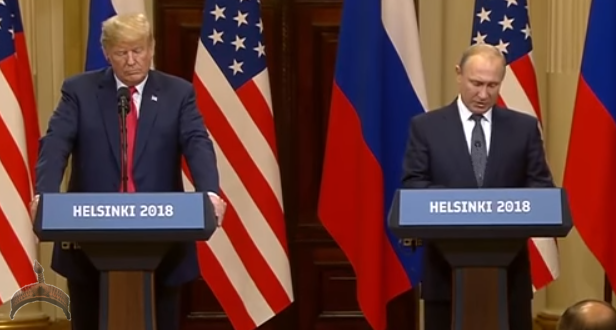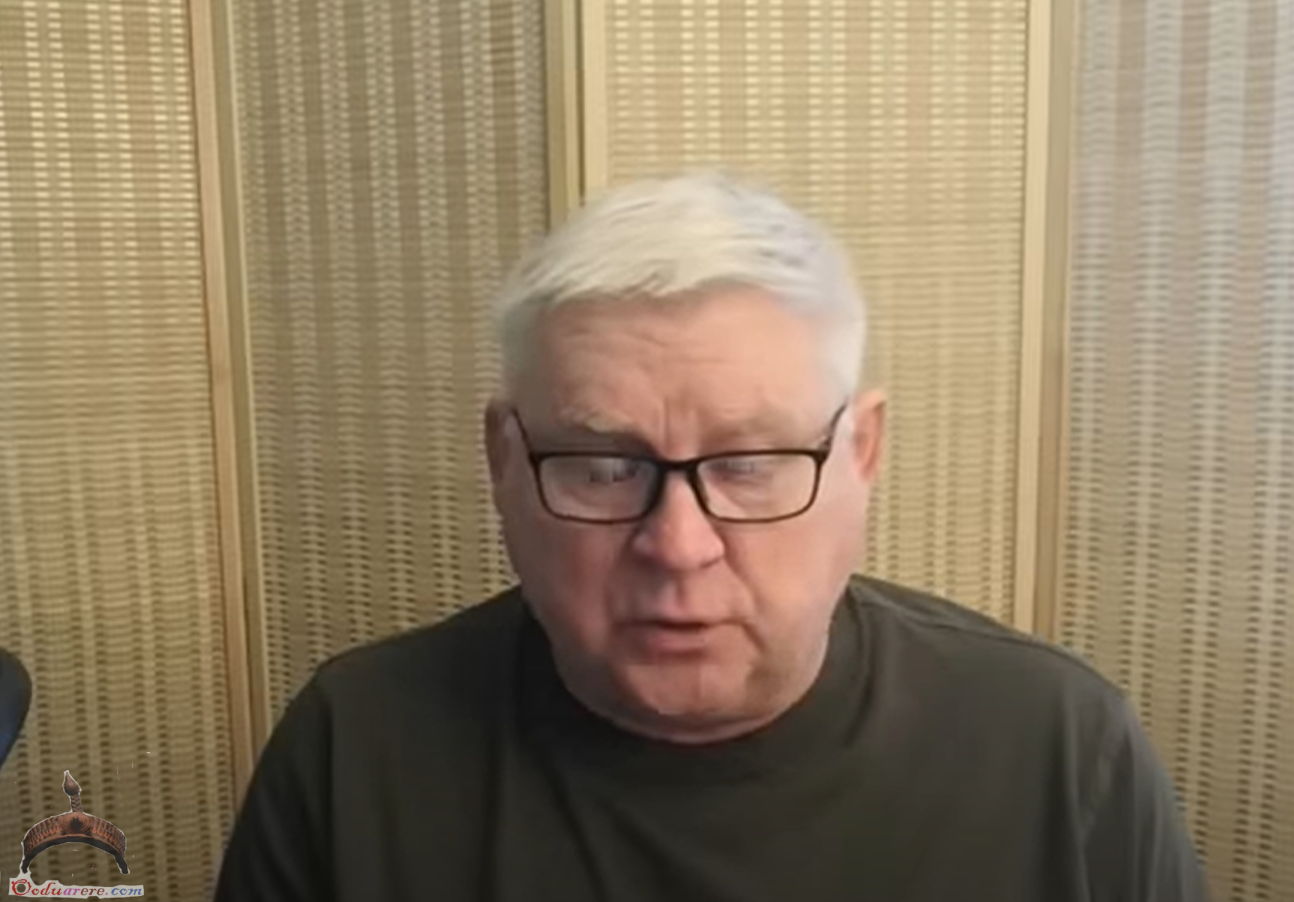President of Russia Vladimir Putin: Mr President, ladies and gentlemen,
The talks with President of the United States Donald Trump were held in a candid and business-like atmosphere. I think they were quite successful and beneficial.
We reviewed the current state and prospects of Russia-US relations and key international issues. It is obvious to everyone that our bilateral relations are undergoing a complicated period but there is no objective reason for these difficulties and the current tense atmosphere.
The Cold War ended long ago, the era of acute ideological confrontation belongs to the distant past, and the situation in the world has fundamentally changed.
Today both Russia and the United States are facing completely different challenges – the mechanisms of international security and stability are dangerously out of balance, there are regional crises, the spread of the threat of terrorism and cross border crime, crime in general, growing world economic problems, environmental and other risks. It is possible to cope with all this only by working together. I hope we will come to this same understanding with our American partners.
Today’s talks reflected the shared desire of President Trump and myself to correct the negative situation in bilateral relations and map out initial steps to improve them, restore an acceptable level of trust and return to the former level of cooperation on all issues of mutual interest.
As a major nuclear power, we have special responsibility when it comes to international security. I consider it important, as we discussed, to get the dialogue on strategic stability and the non-proliferation of weapons of mass destruction on track. We made a note with a number of concrete proposals on this matter available to our American colleagues.
We believe that continued joint efforts to fully work through the military-political and disarmament dossier is necessary. That includes the renewal of the Strategic Offensive Reductions Treaty, the dangerous situation surrounding the development of elements of the US global missile defence system, the implementation of the Treaty on the Elimination of Intermediate-Range and Shorter-Range Missiles, and the topic of deploying weapons in space.
We are in favour of continued cooperation in the sphere of combating terrorism and ensuring cybersecurity. Notably, our special services are working together quite successfully. The most recent example of that is the close operational interaction with a group of US security experts as part of the World Cup in Russia that ended yesterday. Contacts between the special services should be made systematic. I reminded the President of the United States about the proposal to reconstitute the anti-terror working group.
We covered regional crises extensively. Our positions do not coincide on all matters, but nonetheless there are many overlapping interests. We should be looking for common ground and working more closely, including at international forums.
Of course, we talked about regional crises, including Syria. With regard to Syria, restoring peace and harmony in that country could serve as an example of successful joint work.
Of course, Russia and the United States can take the lead in this matter and organise cooperation to overcome the humanitarian crisis and help refugees return to their hearths.
We have all the requisite elements for effective cooperation on Syria. Notably, Russian and American military have gained useful experience of interaction and coordination in the air and on land.
I would also like to note that after the terrorists are routed in southwest Syria, in the so-called “southern zone”, the situation in the Golan Heights should be brought into full conformity with the 1974 agreement on the disengagement of Israeli and Syrian forces.
This will make it possible to bring tranquillity to the Golan Heights and restore the ceasefire between the Syrian Arab Republic and the State of Israel. The President devoted special attention to this issue today.
I would like to emphasise that Russia has a stake in this course of events and will adhere to exactly this position. This will constitute a step towards establishing a just and durable peace on the basis of UN Security Council Resolution 338.
It is good that efforts to gradually solve the problem of the Korean Peninsula have begun. This became possible largely because President Trump got personally involved and pursued dialogue in the spirit of cooperation rather than confrontation.
During the talks we openly discussed Russia’s concern over the US withdrawal from the Joint Comprehensive Plan of Action on the Iranian nuclear issue. The US knows our position. It remains unchanged. To underscore, due to the nuclear deal Iran has become the country most heavily inspected by the IAEA. This guarantees the exclusively peaceful nature of the Iranian nuclear programme and facilitates the consolidation of the non-proliferation regime.
Returning to our discussion of the Ukrainian crisis, the importance of observing the Minsk agreements in good faith was noted. The United States could be more resolute in insisting on this and could motivate Ukraine’s leaders to engage in this work.
We paid special attention to the economy. Obviously, there is interest in cooperation in the business circles of both countries. The US delegation was one of the biggest at the St Petersburg International Economic Forum in May. It consisted of over 500 US entrepreneurs.
To develop trade and investment, President Trump and I agreed to establish a high-level group that would unite captains of Russian and American business. Business people better understand how to go about mutually beneficial cooperation. Let them consider what can be done and make recommendations.
Once again President Trump touched on the so-called Russian interference in the electoral process in the United States. I had to repeat what I said many times before, including during my personal meeting with the President: Russia has never and will never interfere in US domestic affairs, including the electoral process. We are ready to examine all concrete materials that may be presented, for example, in the framework of the cybersecurity working group, the establishment of which we discussed during our meeting in Hamburg.
And, of course, it is time to unfreeze Russian-US ties between civic organisations and in the cultural and humanitarian sphere. As you know, recently we received a delegation from the US Congress, which was considered almost a historic event, when it should be a regular occurrence.
On this note, we have proposed that the US President think not only on practical issues but also on the philosophy underlying long-term bilateral relations. It would be useful to involve experts on the history and nuances of Russian-US cooperation in this process.
Our idea is to establish an expert council composed of influential Russian and US political analysts, academics, prominent former diplomats and military officers, which would work on finding points of convergence and ways to put bilateral cooperation on a sustainable positive trajectory.
In general, we are satisfied with our first full-scale meeting. Let me say once again that before this, we had only met briefly at international forums. President Trump and I had a good conversation. I hope now we understand each other better, and I thank Donald for this.
Of course, numerous problems remain. We have not managed to clear all the blockages, which would be impossible in one meeting. But I believe we have taken an important first step in this direction.
In conclusion I would like to note that our Finnish hosts helped to create the working atmosphere during the talks. I thank to the leadership of Finland, the Finnish people and residents of Helsinki for what they have done. We know that we have caused a lot of inconvenience for people in Helsinki and we apologise for this.
Thank you for your attention.
<…>
Question: I have a question for the President of the United States.
During your recent European tour, you said that the Nord Stream 2 pipeline project and other projects make Europe hostage to Russia. You suggested saving Europe from this dependence by supplying US liquefied gas.
This past cold winter proved the viability of the current energy supply system in Europe, at a time where the United States was forced to buy additional liquefied gas, including from Russia, to cover the heating needs of Boston.
So, my question: is your idea more of a political nature? Might it lead to a situation where a gap could develop in Europe’s energy supply system which would impact primarily the consumer countries?
And a second question, if I may. Before the meeting with Mr Putin, you called him a rival, but left hope that, perhaps, you would be able to take these relations to a friendly plane. Did you succeed?
Donald Trump: (English transcript)
Vladimir Putin: I would like to add a couple of words to that.
I spoke with the President, including on this topic. We are aware of the President’s position. But I believe that we, as a major oil and gas country – and the United States is also such a country – could work constructively to regulate international markets, because we are not interested in a sharp drop in prices below the lower limit. Our producers, including the United States with its shale oil and gas, will be affected by this.
The profit margin of production comes to naught below certain levels. We are not interested in excessively high prices either, because they can kill refining, engineering and other branches of the economy. We have things to discuss and there is room for cooperation. This is my first point.
Second, with regard to Nord Stream 2, the President expressed concerns about the possible end of transit across Ukraine. I assured him that Russia is willing to keep this transit in place. Moreover, we are willing to renew the transit contract, which expires next year, if the dispute between economic agents is settled in the Stockholm Arbitration Court.
To be continued.
 Ọmọ Oòduà Naija Gist | News From Nigeria | Entertainment gist Nigeria|Networking|News.. Visit for Nigeria breaking news , Nigerian Movies , Naija music , Jobs In Nigeria , Naija News , Nollywood, Gist and more
Ọmọ Oòduà Naija Gist | News From Nigeria | Entertainment gist Nigeria|Networking|News.. Visit for Nigeria breaking news , Nigerian Movies , Naija music , Jobs In Nigeria , Naija News , Nollywood, Gist and more









